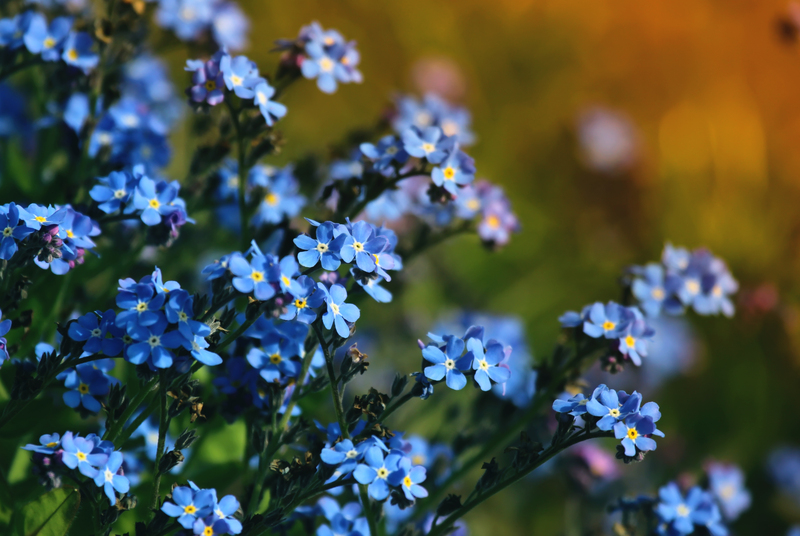Encouraging Playful Exploration in Your Home Garden
Posted on 23/06/2025
The home garden is more than just a space for flowers, vegetables, and decorative plants. It is a living canvas where children and adults alike can discover the wonders of nature through playful exploration. Today, as screens often dominate our daily lives, transforming your garden into a hub of discovery not only inspires curiosity but also contributes to physical, emotional, and mental wellbeing. In this comprehensive article, we'll discuss how you can encourage playful exploration in your home garden, supporting both learning and joy.
Why Foster Playful Exploration in Your Home Garden?
Creating an environment in your garden that fosters playful discovery and hands-on activities offers numerous benefits:
- Boosts Creativity: Open-ended garden play encourages imagination and creative thinking.
- Stimulates the Senses: The sights, sounds, and textures of a garden offer rich sensory experiences.
- Fosters Environmental Stewardship: Kids who delight in the wonders of growing plants are likely to care more about the planet.
- Improves Physical Health: Playful activities in the garden mean movement, which is excellent for motor development and overall health.
- Promotes Emotional Wellbeing: Connecting with nature reduces stress and boosts mood for people of all ages.

Designing a Home Garden for Playful Discovery
To encourage playful exploration in your garden, consider intentional design elements that foster curiosity, creativity, and learning. Here's how you can structure your home garden to invite play:
1. Create Multi-Sensory Areas
A sensory-rich environment is essential for playful exploration. Incorporate features that engage all five senses:
- Sight: Choose plants of varying colors, shapes, and heights.
- Smell: Add fragrant herbs like lavender, basil, and mint to stimulate the sense of smell.
- Touch: Include plants with interesting textures, such as lamb's ear, ferns, and ornamental grasses.
- Sound: Install wind chimes, water features, or plant rustling grasses to create pleasant ambient noises.
- Taste: Grow edible plants like cherry tomatoes, strawberries, or sugar snap peas right at picking height for curious little hands.
2. Provide Discovery Zones
Breaking up the garden into different themed discovery zones can stimulate exploration. Try adding areas such as:
- Bug Hotels and Insect Gardens: Encourage children to look for ladybugs, butterflies, or bees in a pollinator patch.
- Mud Kitchen or Play Area: Supply old kitchen items for sensory play with soil, leaves, and water.
- Fairy or Dinosaur Gardens: Create miniature fantasy worlds with small figurines and natural materials.
- Hideaways: Teepees made from bean poles or willow domes provide secret spots for reading or imagining.
- Water Play: Safe water features or mini-ponds attract wildlife and invite safe, supervised splashing.
3. Incorporate Hands-On Activities
Active participation cultivates genuine curiosity. Here are some engaging activities to support playful learning:
- Planting and Harvesting: Involve children in seeding, watering, and picking crops. Give them their own patch to care for.
- Nature Art Projects: Collect leaves, flowers, and stones to craft natural mandalas or collages.
- Observational Journals: Encourage kids to record what they see, hear, and feel in a garden journal with drawings, pressed flowers, or stories.
- Scavenger Hunts: List items of different colors, textures, or shapes to find around the garden.
- Composting: Teach about cycles of life and decomposition by involving the family in composting food scraps and leaves.
Making Your Garden Safe for Playful Exploration
Safety is paramount when creating a garden that invites playful discovery. Keep these tips in mind as you plan:
- Choose Non-Toxic Plants: Avoid species known to be toxic to children and pets. Double-check every addition if you are unsure.
- Secure Water Features: If you have ponds or water play areas, ensure they are shallow and supervised or covered when not in use.
- Safe Tools and Materials: Provide age-appropriate gardening tools with rounded edges. Avoid sharp objects and lock away sheds or chemicals.
- Clear Pathways: Ensure paths are wide enough and free of tripping hazards like large rocks or overgrown roots.
- Supervision: While encouraging independent exploration, keep a watchful eye, especially with younger children.
Ideas for All Ages: Playful Exploration in Your Family Garden
Playful exploration in the garden isn't just for children. With a few creative choices, your home garden can entertain and inspire older kids, teens, adults, and even seniors. Here are ideas for every age group:
For Early Learners and Young Kids
- Colorful Pathways: Use stepping stones or painted rocks to create winding pathways.
- Secret Spaces: Build a sunflower house or tunnel made from tall sturdy plants.
- Theme Gardens: Try pizza gardens (tomatoes, basil, oregano) or butterfly gardens for simple, understandable themes.
- Sensory Bins: Fill tubs with seeds, bark, and leaves for hands-on sensory play on rainy days.
For Tweens and Teens
- DIY Projects: Let them build birdhouses, insect hotels, or vertical planters.
- Photography: Hand over a camera or phone for creative nature photography challenges.
- Wildlife Surveys: Create wildlife checklists and encourage logging bird or insect sightings.
- Garden Science Experiments: Test soil pH, monitor plant growth, or try seed starting with controlled variables.
For Adults and Seniors
- Outdoor Meditation Corner: Set up a tranquil space with fragrant plants and comfortable seating for relaxing and reading.
- Culinary Gardens: Experiment with exotic herbs, edible flowers, or heirloom vegetable varieties for culinary adventures.
- Garden Clubs or Family Challenges: Host family growing contests, like "biggest sunflower" or "tastiest tomato."
- Art in the Garden: Integrate sculpture, mosaic stepping stones, or outdoor painting sessions.
Nature Play and Child Development
A playful home garden nurtures essential developmental skills in children--including sensory integration, fine and gross motor development, problem-solving, and resilience. Here's how:
- Risk Assessment: Children learn to gauge safe challenges by climbing, balancing, or gently handling garden creatures.
- Teamwork and Socialization: Community planting or nature games foster cooperation and communication.
- Responsibility and Patience: Tending to plants instills a sense of responsibility and patience as children watch seeds grow over time.
- Environmental Awareness: Regular encounters with bugs, birds, and plants nurture empathy for living things.
Embracing the Seasons in Your Playful Garden
One of the joys of a home garden is watching how it changes throughout the year. Instilling a sense of wonder with playful exploration in every season makes the experience richer:
- Springtime: Go on a bud and blossom hunt or look for signs of returning pollinators.
- Summer: Set up evening scavenger hunts, picnics, or star-gazing nights among the fragrant flowers.
- Autumn: Collect fallen leaves for crafts, seed gather for next year, or build bug hotels using twigs and bark.
- Winter: Observe frost patterns, watch for animal tracks, or feed winter birds with homemade feeders.
Simple Projects to Start Playful Exploration Today
Ready to jump in? Here are a few simple projects to ignite curiosity and playful exploration in your home garden right away:
- Plant a Butterfly Garden: Research which native plants attract butterflies and create a small plot or container planting.
- Herb Spiral: Build a spiral mound from rocks and soil, plant with a variety of herbs, and invite a sensory stroll.
- Bug Habitat: Use drilled logs, bamboo, and pinecones to build a bug hotel and monitor the visitors over time.
- Nature Mandalas: Gather petals, pebbles, and leaves to craft colorful transient art right on the ground.
- Scavenger Hunt: Create lists of natural treasures to find--like a feather, a smooth stone, or a seedpod--and challenge your family to a friendly race.

Tips to Sustain a Culture of Playful Exploration in Your Garden
- Rotate Activities: Change up the challenges, creative prompts, and discovery zones regularly to maintain engagement.
- Let Children Lead: Encourage kids to come up with garden projects or areas they'd like to explore.
- Log Discoveries: Start a shared garden journal or photo album to celebrate fun finds and growth over time.
- Celebrate All Weather: Equip your garden with rain boots, umbrellas, and sun hats to encourage exploration whatever the weather.
- Invite Friends and Family: Playful gardens are more fun when shared--host a nature treasure hunt or garden picnic to create lasting memories.
The Lasting Value of Playful Exploration in Your Home Garden
By prioritizing playful exploration in your home garden, you create a nurturing world where curiosity blooms alongside flowers and vegetables. No matter your space--large yard, small patio, or urban balcony--imaginative zones and nature-inspired play can be part of your garden's story. Through thoughtful design, hands-on activities, and an open invitation to wonder, your garden becomes not just a place of growth for plants, but for adventurers, artists, and lifelong learners of all ages.
Start today: embrace a playful, explorative spirit in your home garden and watch the transformation--both in your plants and in your family.
Latest Posts
Crafting Fertile Grounds from Organic Waste Materials
Your Pathway to a Blossoming Garden: 9 Beginner's Tips
Explore how your backyard garden can be a tool for climate action
Keep Your Garden Safe: Combat Extreme Weather Conditions
Revitalize Your Garden with Creative and Comfortable Seating Ideas

